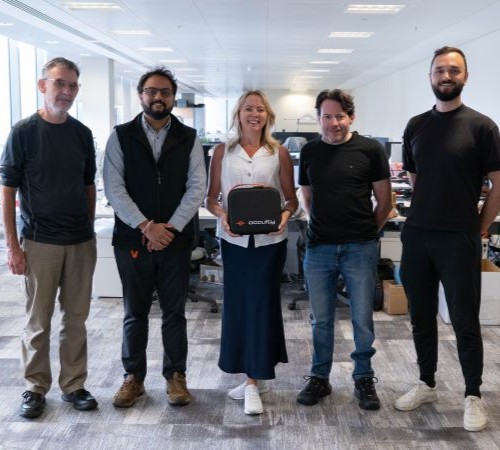The Colin Campbell Mitchell Award commemorates the life and work of one of Scotland's most accomplished marine engineers, Edinburgh-born Colin Campbell Mitchell OBE FRSE (1904-69). He had a long and distinguished career with Brown Brothers Engineering, where he pioneered the development of the steam catapult for use on aircraft carriers.
A cash prize of £6,000 will be awarded to the chosen team.
Who is eligible to be nominated?
- A team will have made the greatest contribution to the advancement of any field of engineering within the period of the four years prior to the making of the award.
- Nominees must be a team, with a maximum of six members, working or studying in the UK.
- Self-nominations are not accepted. If you wish to be considered but do not have a nominator, please contact the Academy.
Meet our 2025 winner
Occuity
The team have invented a handheld optical device, designed to measure corneal thickness – a key step in diagnosing glaucoma – without touching the eye.
Occuity’s innovative PM1 pachymetry device is handheld and designed to measure corneal thickness in a matter of seconds without touching the eye. Previously this was done with ultrasound and required anaesthetising eye drops and contact with the eye, which could be both unpleasant for the patient and time-consuming for the clinician. Up until now the alternative, non-contact pachymeters, were desk-bound and expensive.
The Occuity team had to address multiple challenges to invent this handheld device, including miniaturisation of complex optical systems, development of high-speed lens scanning and advanced algorithms in order to achieve reliable results. They also had to put in place a medical device certified manufacturing facility in Reading to make them.
Their PM1 device is now on market in nearly 20 different countries and the Occuity team are working on further developing their platform optical technology to produce meters to screen for other ophthalmic conditions including myopia. In the mid-term, the technology is being advanced to address systemic diseases such as diabetes and Alzheimer’s Disease. The intention is that these Oculomics products will help in the prevention of, rather than just the treatment of, these major chronic conditions

From left to right: James Reynolds, Shashin Lad, Sharon Brand, Martin Newman, Jamie Serjeant
The Occuity team includes Dr Robin Taylor, Co-Founder and Chief Technical Officer; James Reynolds, Chief Optical Engineer; Sharon Branch, Chief Operating Officer; Shashin Lad, Senior Firmware and Electronics Engineer; Martin Newman, Senior Manufacturing Technician and Jamie Serjeant, Lead Engineer (and a recipient of the Academy’s 2024 Young Engineer of the Year award).
A selection of our awardees
News about the Colin Campbell Mitchell Award

World’s first non-contact handheld device to support glaucoma diagnosis wins award for advancement of UK engineering
A team of six from optical healthcare company Occuity have been awarded the 2025 Colin Campbell Mitchell Award by the Royal Academy of Engineering. The team have invented a handheld optical device, d…

Arm engineers behind groundbreaking tools to model and test computer chips win prestigious Academy award
Six engineers from the Arm Architecture Formal Team have been awarded this year’s Colin Campbell Mitchell Award by the Royal Academy of Engineering. The team develops practical tools to model and tes…




